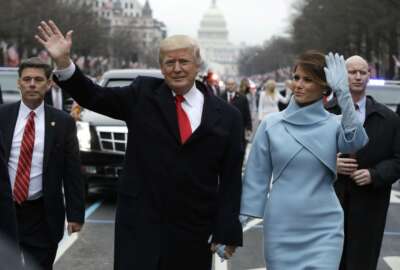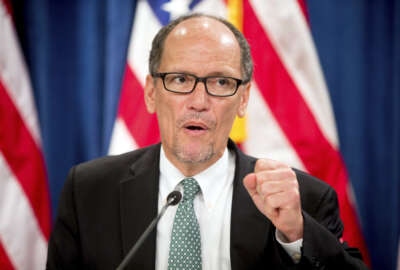

White House Press Secretary Sean Spicer said the resolution is part of a package, signed by President Donald Trump, to "roll back job killing rules."
President Donald Trump on Monday signed a joint resolution shutting down an Obama administration-era rule that supporters said evened the playing field for law-abiding contractors, but which the current administration said amounted to “blacklisting” easy targets.
House Joint Resolution 37 stated that Congress “disapproves” the Fair Pay and Safe Workplaces rule and “such rule shall have no force or effect.”
H.J. Res. 37 was part of a package of resolutions signed March 27 by President Trump, which “roll back job killing rules,” said White House Press Secretary Sean Spicer during a press briefing earlier in the day.
Congress used the Congressional Review Act to pass the resolution. The act lets Congress overrule a package of regulations through a joint resolution.
Spicer said manufacturers had identified the rule “as one of the most significant threats to growing American business and hiring more American workers.”
“The rule simply made it too easy for trial lawyers to go after American companies and American workers who contracted with the federal government,” Spicer said.
President Barack Obama signed the order in 2014. The regulations would have required companies to disclose violations for 14 labor law protections that occurred in the past three years.
In its Statement of Administration Policy, the Trump White House said the rule “would bog down federal procurement with unnecessary and burdensome processes that would result in delays, and decreased competition for federal government contracts.”
“The administration is committed to reducing onerous regulatory burdens on America’s businesses and using existing authorities to continue enforcing the nation’s workplace laws,” the White House said.
Sen. Ron Johnson (R-Wis.), chairman of the Homeland Security and Governmental Affairs Committee, and Sen. Lamar Alexander (R-Tenn.), chairman of the Committee on Health, Education, Labor, and Pensions, issued statements saying they applauded Trump’s signing of the resolution.
“Repealing this rule is just one of many efforts we will undertake to provide the regulatory relief that is necessary to unleash the American economy so that it can realize its full potential,” Johnson said.
“The harmful Obama administration ‘blacklisting’ regulation could have prevented contractors from receiving a federal contract for an alleged labor violation before any wrongdoing has been proven,” Alexander said.
Rep. Virginia Foxx (R-N.C.), chairwoman of the Committee on Education and the Workforce, in a statement called the rule “flawed” and “completely unnecessary.”
“There has long been a system in place to hold federal contractors accountable, and the best way to ensure fair pay and safe workplaces is to enforce that system effectively,” Foxx said. “This duplicative rule would have served only to empower union bosses, while undermining our nation’s military readiness and the ability of small businesses to compete for federal contracts.”
Ben Brubeck, vice president of regulatory, labor and state affairs with Associated Builders and Contractors (ABC), said in a statement that the rule violated due process rights for contractors, “by forcing them to report mere allegations of misconduct — which are often frivolous and filed with nefarious intentions by special interest groups — the same as fully adjudicated violations.”
Professional Services Council President and CEO David Berteau said the signing restores “fairness to the government contracting community and removed an onerous and unfair burden.”
“The regulation would not have helped the Labor Department’s existing labor law enforcement, and it would have further slowed the acquisition process, elevated unsubstantiated allegations to the same status as convictions, and imposed new and unnecessary requirements on contracting officers and contractors,” Berteau said.
But the resolution’s signing was not without its detractors. In a statement from the International Brotherhood of Teamsters, Teamsters General President Jim Hoffa said the resolution eliminates worker protections and was a “disappointing development.”
“Under the executive order, companies that contracted with the government were held accountable for violating workplace laws,” Hoffa said. “The executive order also put in place regulations that addressed key issues workers are faced with on the job at federal contractors including wage theft, safety violations and discrimination. Every worker deserves strong protections on the job.”
The rule suffered a setback In October, when a judge in the Eastern District of Texas placed a preliminary injunction on it the day before its effective date.
“The [Federal Acquisition Regulation] Rule likely violates the due process rights of plaintiffs’ government contractor members by compelling them to report and defend against non-final agency allegations of labor law violations without being entitled to a hearing at which to contest such allegations,” the court said.
Federal News Radio reported on the injunction, and Eric Crusius, senior counsel at Holland & Knight, said it was surprising how closely the court’s decision mirrored the ABC’s complaints.
The judge did not, however, put a hold on the paycheck transparency portion of the order, which requires contractors and subcontractors to provider workers with “a document with information concerning that individual’s hours worked, overtime hours, pay, and any additions made to or deductions made from pay.”
Copyright © 2024 Federal News Network. All rights reserved. This website is not intended for users located within the European Economic Area.


